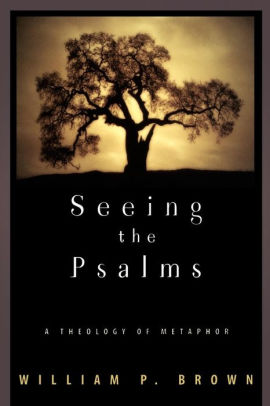
(This is the 7th installment in this 12-part series. Go here for the previous article. Click here for the next article in the series.)
I am looking through another old seminary textbook this morning, Seeing the Psalms: A Theology of Metaphor, by William P. Brown. In chapter 2, Brown discusses the metaphor of “pathway”. I found a reference to one of the historical psalms, Psalm 77, which I identified a month ago in my first post.
Brown indicates that God’s “way” is used in two slightly different senses. The Psalmist expresses, “I will reflect upon all your work, and meditate on your mighty deeds. Your way (derek), O God, is holy. What god is so great as our God? . . . Your way (derek) was through the sea, your path, through the many waters; yet your footprints left no trace. You led your people like a flock by the hand of Moses and Aaron” (Ps. 77:12-13, 19-20).
Brown states, “As an encompassing metaphor, God’s ‘way’ collectively refers to God’s mighty acts in history (vv. 12-13), concretized in the exodus, the paradigmatic event or ‘root experience’ of divine deliverance. Here, God’s ‘way,’ moreover, is unlike any other mode of activity. It reflects YHWH’s incomparability as High God, unsurpassable in strength and unwavering in concern for a people: God’s path is traceless amid the ‘many waters,’ yet tangibly embodied in the leadership exercised by God’s earthly representatives, Moses and Aaron” (p. 43).
I appreciate Brown’s observation that God’s way shows His “incomparability”, and that He is “unsurpassable in strength” and “unwavering” in concern for His people. His ways are so much higher than ours. Isaiah states, “As the heavens are higher than the earth, so are my ways higher than your ways and my thoughts than your thoughts” (Isa. 55:9). I also like that Brown points out that God used His servants Moses and Aaron to lead His people. This illustrates the partnership between God’s presence and man’s work that I call “Immanuel labor”. Both God and His faithful servants are working together to lead God’s people through the Red Sea.
As I look at the context of Psalm 77, the psalmist is crying out to God for help (v. 1). He is bemoaning his distressed condition (vv. 2-4). The “former days” were filled with songs (vv. 5-6). Now, he is feeling rejected by the Lord (v. 7). He does not see God’s unfailing love and wonders if He is no longer keeping His promises (v. 8). The only thing that brings the psalmist comfort is when he chooses to reflect on “the years of the right hand of the Most High”, the “deeds of the Lord”, and “your miracles of long ago” (vv. 10-11). He remembers these things that God did for His people in the past, which gives him hope for the present and the future.
I see a more distinct contrast than Brown does between how God’s “way” is described in verses 13 and 19. In v. 13, when the psalmist interjects, “Your ways, O God, are holy”, he appears to be referring more to God’s greatness of character in general, rather than specific acts of deliverance. Admittedly, though, it is often hard to separate them; God’s attributes are displayed in His performance (v. 14). When the psalmist refers to God’s way again in v. 19, “Your path led through the sea, your way through the mighty waters”, it is being used in a more specific sense. God showed the Israelites the exact route they needed to go through the Red Sea.
The psalmist ends this psalm with a focus on God’s leadership. God had led His chosen people as a shepherd leads his flock (v. 20). In verses 15 and following where the psalmist rehashed the exodus, we can clearly see God’s mighty power and His covenant faithfulness. If this same God is still God, then the psalmist can rest in the fact that He is able to deliver, redeem, and lead once again, no matter what he is going through now.
This discussion shows the value of the psalms that take us back to the past. The path we find ourselves on may not be clear. We may wonder where God is taking us. We can easily forget what He has done for His people collectively and for us personally. When we actively call to mind the many times where God clearly intervened on our behalf and infiltrated our lives with His presence and power, we can courageously face an uncertain future, knowing full well that He is still in control and will lead us beside the still waters (Ps. 23:2).

Master Sergeant Russell E. Gehrlein (U.S. Army, Retired) is a Christian, husband of 38 years, father of three, grandfather of four, blogger, and author of “Immanuel Labor – God’s Presence in our Profession: A Biblical, Theological, and Practical Approach to the Doctrine of Work”, published by WestBow Press in February 2018. He received a B.S. in Mathematics from Colorado State University in 1980 and an M.A. in Biblical Studies from Grand Rapids Theological Seminary in 2015. He is also a former junior/senior high school math and science teacher and youth pastor. Russ currently works as a Department of the Army civilian at Fort Leonard Wood, Missouri.





